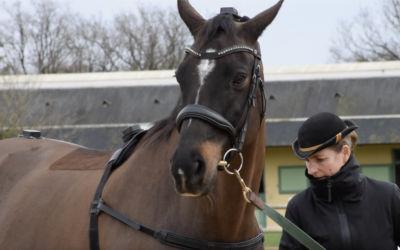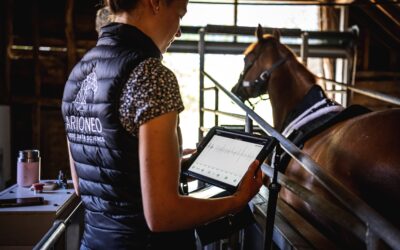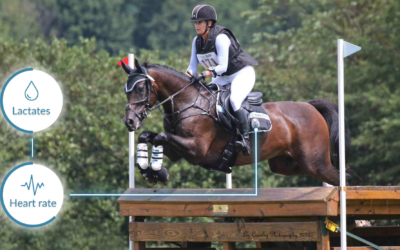EXPLORE
OUR BLOG
Here you will find information about performance and health measurements as well as tips about athlete horse health monitoring, telemedicine cases and equine well-being.

Subscribe to our newsletter
LATEST ARTICLES
ALL ARTICLES
Combining well-being and high performance: how Equisym brings serenity to Pauline Basquin’s work with her horses?
We were lucky enough to interview the professional dressage rider Pauline Basquin about her use of EQUISYM. Find out how new technologies can be perfectly integrated into high-level equestrian practice.
4 reasons to use Equisym during a pre-purchase examination
By using advanced motion sensor technologies such as EQUISYM, the veterinarian is able to take an objective and precise approach to assessing the horse’s physical condition and locomotion, providing essential information to guide purchasing decisions.
Kevin Staut and Marie Madeuf’s experience with EQUISYM
We were lucky enough to interview the professional jumping rider Kevin Staut about his use of EQUISYM. Find out from Dr. Marie Madeuf and Kevin Staut how new technologies can be perfectly integrated into high-level equestrian practice.
Heart murmurs in horse athletes
The cardiovascular system can be compared to a huge orchestra, and the presence of any structural defect can alter the functioning of the system and throw the orchestra out of harmony. A heart murmur is added to the initially audible heartbeat and becomes a false note in the orchestra, requiring the trainer to intervene on several levels.
Overtraining and under-performance: early detection
Overtraining is characterized by an imbalance between training activity and recovery periods, resulting in chronic fatigue and impaired performance. Overtraining can result in under-performance and a loss of results for the horse.
Aerobic capacity: how does it impact racehorses?
Aerobic capacity in a racehorse is described as the usage of oxygen to provide the energy required to sustain the activity. To move, a horse must use a combination of metabolic and biochemical processes to generate energy.
The demand for energy in horses is constant, whether it’s to maintain, perform, or develop muscle. Whatever the effort, the horse needs a transfer of chemical energy to respond to mechanical work. To meet this energy demand, numerous metabolisms are activated, and training can help to strengthen these diverse processes.
Atypical equine myopathy
Myopathy is a muscular disease that affects horses. That is mainly associated with the consumption of certain tree species, especially sycamore maples. When horses graze on pastures where these trees are located, they can ingest toxins that damage muscles and cause muscle failure. Usually fatal, this disease can occur at any time of the year, although it is more common in the fall.
Optimising bone repair
Optimising bone repair is central to limiting the risk of injury. Adequate post-injury rest periods are vital to allow the bone structure to regenerate. What are the time markers for rest phases? What type of protocol is most effective? How can monitoring help detect bone fatigue?
Standardised test of effort in athletes horses
The Standardised test of effort is a tool for checking a horse’s state of fitness by characterising his response to a workload. Like all athletes, horses need to be physically and mentally ready before a major sporting event. That’s why it’s worth incorporating this tool for objectively measuring the horse’s various physiological parameters.
.









